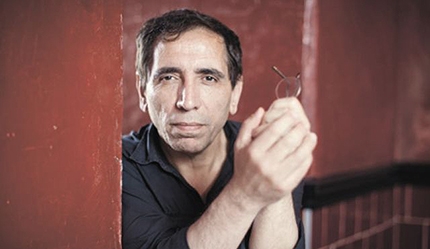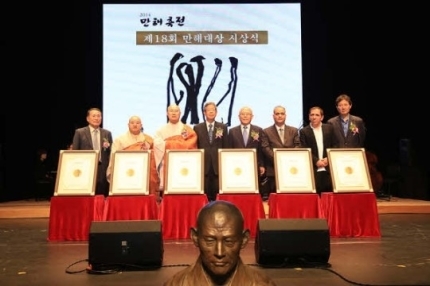


Iranian dissident and film director Mohsen Makhmalbaf received the 18th Manhae Peace Award, the Manhae Prize Committee said Tuesday.
In 2004 Nelson Mandela, former president of South Africa, received this prize and and two years later this prize was given to Tibetans spritual leader Dalai Lama. Nobel Peace Prize laureate Shirin Ebadi won it in 2009 and M. Fethullah Gülen the Turkish poet was the winner in 2013.
The award was established in 1997 to commemorate Han Yong-un — a Korean poet, reformer and activist who used the pen name Manhae. Han fought for Korean independence in the early 20th century, when the country was under Japanese occupation.
The committee said it had chosen to honor Makhmalbaf for resisting oppression and living an artistic life, just as Han had.
The award ceremony took place Tuesday at a community center in Inje, Gangwon Province.
"I find this award special because its name has peace in it," Makhmalbaf said Monday during a media conference at the Asia Journalist Association in Seoul.
The 57-year-old director, born in Tehran, is a globally renowned filmmaker and human rights activist. His representative film "Kandahar" won the Grand Prize from the Society of Churches of the World at the Cannes film festival in 2001. Its vivid depiction of life under the Taliban in Afghanistan earned it recognition in 2001as one of Time magazine's best 100 films in the history of world cinema.
"My hardships and unusual experiences made me who I am now," the director said. "I came to be able to feel the pain of people under pressure, poverty or injustice, and it helped me to express more in film."
He fought the Iranian dictatorship in Tehran and spent five years in prison, where he underwent torture. He turned to filmmaking following his release.
"After the Iranian revolution succeeded, some of my friends who fought against the government went into politics," he said. "But I didn't think politics had changed — the dictator stepped down, but that doesn't mean we achieved democracy. I wanted to genuinely influence people through film to create real change."
In 2005, when Ahmadinejad came into power, Makhmalbaf left Iran in protest. He now lives in exile with his family.
Many Iranian dissidents living overseas risk being murdered by the Iranian government, he said. Despite the danger, he is still fighting for human rights in Afghanistan, Tajikistan and Iran.
"One day we will all die, so it doesn't matter if death is near," said the activist filmmaker. "As long as I'm alive, I want to affect the lives of people."
He is now completing "The President" in London. The film tells the story of a dictatorial regime and its tragedies before and after a revolution.
Source of the news:

